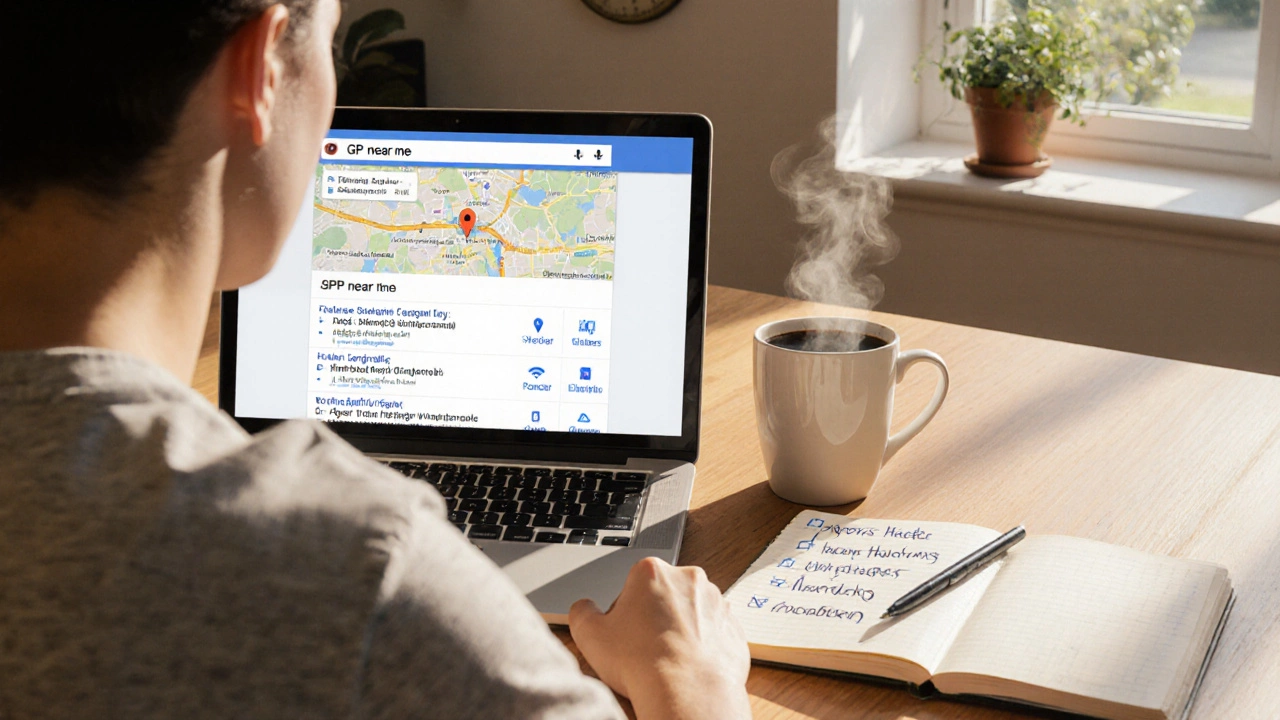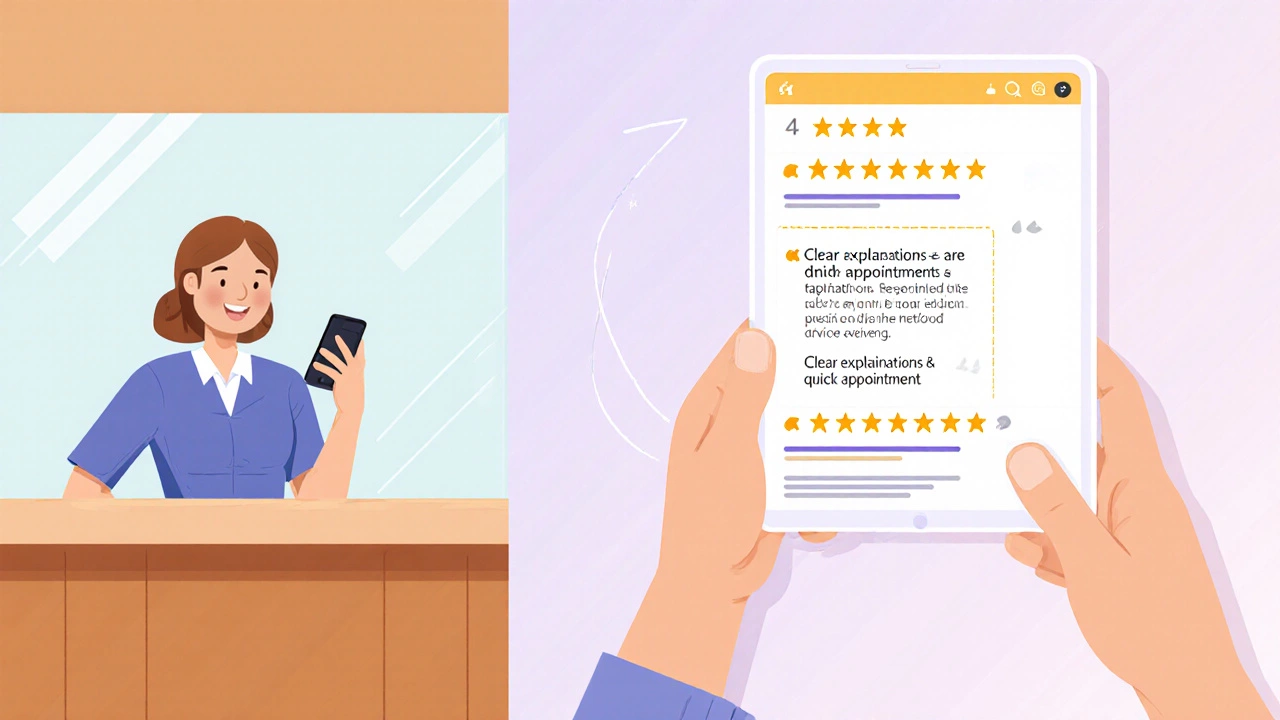 Oct, 19 2025
Oct, 19 2025
GP Finder Comparison Tool
Find Your Perfect GP
Compare potential GPs based on your priorities to make an informed decision. This tool helps you evaluate clinics using the criteria from our step-by-step guide.
When you need a reliable doctor that knows your neighbourhood, the search for a good GP can feel overwhelming. Below is a practical roadmap that takes you from the first Google query to the day you walk into a clinic confident you’ve made the right choice.
What a General Practitioner Actually Does
General Practitioner is a primary‑care medical professional who provides routine check‑ups, treats common illnesses, manages chronic conditions, and coordinates referrals to specialists. General Practitioners are often the first point of contact in a health system and play a key role in preventive care.
Why Choosing the Right GP Matters
- Continuity of care reduces hospital admissions and improves medication adherence.
- Familiarity with your medical history means quicker diagnoses.
- Good communication builds trust, which is essential for mental‑health discussions.
Step 1 - Define Your Priorities
Before you type anything into a search engine, write down what matters most to you. Common criteria include:
- Location and proximity to public transport or your home.
- Office hours - evenings or weekends may be non‑negotiable.
- Language support - especially important in multicultural areas like Auckland.
- Special interests, such as paediatric care, women's health, or chronic‑disease management.
- Accreditation status and quality ratings.
Having a checklist keeps your search focused and prevents you from being swayed by flashy websites that don’t meet your needs.
Step 2 - Use Trusted Local Directories
New Zealand maintains a few official resources that list licensed practitioners:
- Medical Council of New Zealand - a searchable register showing whether a GP’s practising certificate is current.
- Healthpoint - provides location maps, phone numbers, and patient‑review summaries for most clinics.
- NZ Health Navigator - includes information on services offered, cost structures, and accessibility features.
Start by entering your suburb or postcode. Filter the results using the criteria you listed in Step 1.
Step 3 - Check Clinic Accreditation and Quality Scores
In New Zealand, the Clinic Accreditation programme audits practices for infection control, record‑keeping, and patient‑safety protocols. Accredited clinics display a badge on their website; you can verify the badge on the accreditation body’s site.
Quality scores often come from the Ministry of Health’s Primary Health Care Quality Improvement Programme. Look for metrics such as:
- Vaccination coverage rates.
- Chronic‑disease management outcomes (e.g., HbA1c control for diabetes).
- Patient‑experience survey results.
Higher scores usually indicate a practice that follows evidence‑based guidelines and invests in staff training.

Step 4 - Read Real Patient Reviews
Online sentiment is a powerful indicator of day‑to‑day experience. Platforms that specialise in medical feedback include:
- Patient Review Site - aggregates ratings on wait times, bedside manner, and ease of booking.
- Social media groups for local communities (e.g., Auckland Mums, West Auckland Residents).
When scanning reviews, watch for patterns rather than isolated comments. Consistent praise for “clear explanations” or recurring complaints about “unavailable appointments” are more reliable than a single extreme review.
Step 5 - Test the Booking Process
Call or use the online portal to book a routine appointment. Pay attention to:
- Response time - a busy practice may take days, but a well‑run clinic usually answers within 24 hours.
- Staff friendliness - helpful receptionists set the tone for the whole visit.
- Clarity of instructions - are you told what to bring, how long the consult will take, and whether you’ll need to fill out forms beforehand?
If the experience feels smooth, it’s a good sign the practice values patient communication.
Step 6 - Verify Insurance and Cost Transparency
Even if you have a private health plan, not all GPs bill the same way. Ask about:
- Co‑pay amounts for standard consultations.
- Whether bulk‑billing (no out‑of‑pocket fee) is available.
- Charges for services not covered by insurance, such as certain vaccinations or travel health advice.
Transparent cost information on the website or during the call means you’re less likely to face surprise bills.
Step 7 - Choose a GP and Give It a Trial Run
After narrowing your list to two or three candidates, schedule a short introductory visit - perhaps a routine check‑up or a medication review. During the appointment, assess:
- How well the GP listens and explains without jargon.
- Whether the practice feels clean, organized, and respectful of privacy.
- How quickly any follow‑up actions (e.g., lab results) are communicated.
If you feel heard and comfortable, you’ve likely found the right match. If not, repeat the process with the next practice on your shortlist.
Comparison Table - Quick Reference for Choosing a GP
| Factor | What to Look For | How to Verify |
|---|---|---|
| Location | Within 5 km or easy public‑transport access | Map on Healthpoint or Google Maps |
| Office Hours | Evenings/weekends if needed | Clinic website schedule |
| Accreditation | Clinic Accreditation badge | Check accreditation body’s registry |
| Patient Ratings | Average ≥4/5 and consistent comments | Patient Review Site, social groups |
| Insurance Compatibility | Listed on practice’s billing page | Contact practice or insurance provider |
| Special Interests | Paediatrics, women’s health, chronic disease | Service list on NZ Health Navigator |

Common Pitfalls and How to Avoid Them
Even with a solid process, it’s easy to slip into traps that waste time:
- Relying solely on price. The cheapest option may lack proper accreditation or have long wait times.
- Choosing a GP based only on online ratings without checking credentials. Some reviews can be fake or outdated.
- Ignoring language needs. If you need Māori translation or a specific dialect, confirm that the practice offers it before booking.
- Overlooking continuity. Switching GPs frequently can fragment your medical record and affect chronic‑disease management.
Keep the checklist handy as you compare options - it’s the fastest way to spot red flags.
When to Switch Your GP
Even a perfect match can change over time. Consider changing if you notice any of the following:
- Consistent difficulty getting appointments within a reasonable timeframe.
- Repeated miscommunication about test results or medication instructions.
- A shift in the practice’s hours that no longer fits your schedule.
- Loss of accreditation or a drop in quality scores.
Switching is simple: request your medical records (the practice must provide them within 20 working days) and transfer them to the new GP.
Local Resources for Auckland Residents
If you live in Auckland, these extra tools can speed up your search:
- Auckland Healthline - a free helpline that can suggest nearby practices based on your postcode.
- Westpac GP Finder app - integrates Healthpoint data and allows you to book directly from your phone.
- Community health centres such as Mt Wellington Family Health that offer sliding‑scale fees for low‑income families.
Recap of the 7‑Step Process
- List your must‑have criteria.
- Search official directories (Medical Council, Healthpoint, NZ Health Navigator).
- Check accreditation and quality scores.
- Read consolidated patient reviews.
- Test the appointment booking experience.
- Confirm insurance compatibility and cost transparency.
- Schedule a trial visit and evaluate the personal fit.
Follow these steps and you’ll turn a vague online search into a confident, long‑term health partnership.
Frequently Asked Questions
How far should my GP be from home?
Ideally within a 5‑kilometre radius or a 10‑minute drive, especially if you need to visit for urgent issues or regular monitoring.
Do all GPs in New Zealand accept bulk‑billing?
No. While many practices offer bulk‑billing for patients without private insurance, some charge a standard consultation fee. Always ask before the first visit.
Can I switch GPs without my current doctor’s permission?
Yes. You can request a copy of your health record and choose a new practice. Your former GP must provide the records, but they cannot block your transfer.
What does the Clinic Accreditation badge guarantee?
It verifies that the clinic meets national standards for safety, hygiene, record‑keeping, and staff qualifications. Accredited clinics undergo regular audits.
How can I find GPs who speak Te Reo Māori?
Use the Medical Council register’s advanced search filter for language proficiency, or call the practice directly to ask about Māori‑language services.
